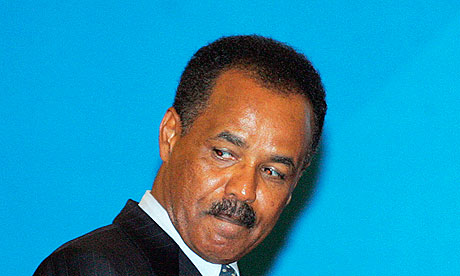Eritrea denies reports that president Aferwerki is to step-down
By Tesfa-Alem Tekle
December 10, 2012 (ADDIS ABABA) – The Eritrean government has dismissed recent reports alleging that the long-time leader of Eritrea, Isaias Afewerki, has decided to stand-down in 2013.

However, Eritrea’s presidential spokesperson, Yemane Gebremeskel, told the German Deutsche Welle Radio’s Amharic program, that the rumours are baseless.
“In a recent post I asserted that there is a pattern to these rumours. They are usually engendered when some within Ethiopia who want to hide or obscure some event inside Ethiopia,” he said adding they “are just distractions.”
Ethiopian Review claimed that “the Eritrean president wants to be a Mandela or George Washington-like figure to his country by overseeing a smooth transfer of power on his own terms.”
Anonymous Eritrean opposition political groups based in Addis Ababa told Sudan Tribune on Monday that it is “totally unlikely” that the “Eritrean dictator” will resign or allow a smooth power transfer.
The opposition officials further stressed that the only way to remove Aferwerki from power is by military means or with an uprising, as seen in other countries during the Arab spring.
An Eritrean political analyst, on a condition of anonymity, said that Aferwerki’s alleged decision to resign is “no surprise” because of his deteriorating health and mounting discontent amongst the country’s defence forces.
The Red Sea Afar Democratic Organization (RSADO), chairman, Ibrahim Haron, told Sudan Tribune in November that Eritrea is witnessing a growing division among political and military leaders following worsening corruption in the poorly-funded military.
As result of the corruption, the Eritrean army has begun unprecedented protests and there has been public outcry, according to Haron.
With an estimated 200,000-300,000 troops, Eritrea has the largest armies in sub-Saharan Africa, despite its relatively small population.
Afewerki has ruled the country since 1993 when it gained its independence from Ethiopia after more than 30 years of struggle.
Afewerki was seen as a hero by many of the Eritrean people for his role in the fight for freedom, however when he assumed power he shut down independent news outlets, and stifled freedom of speech and religious practise. Eritrea was described by Human Rights Watch in 2012 as “one of the world’s most repressive governments.”
Tens of thousands of Eritrea’s citizens have fled to neighbouring countries to seek refuge. UN High Commission for Refugees (UNHCR) spokesperson, Andrej Mahecic said during a visit to East Sudan in January, “This is the area hosting one of the most protracted refugee situations in the world. At the moment there are some 70,000 refugees mostly of Eritrean origin and they reside in 12 camps in this part of the country.”
According to UNHCR, approximately 1,700 refugees, mainly from Eritrea, arrive in Sudan every month.
Last week 17 players and the doctor of the Eritrean football squad sought asylum in Uganda after taking part at the East and Central Africa Football Associations senior Challenge Cup.
Similarly, 13 players from Eritrea’s top football club have disappeared in Tanzania after the team was knocked out of a regional tournament in July 2011.
Eritrea’s flag-bearer during the 2012 Olympics sought asylum in the UK in August.
(ST)
